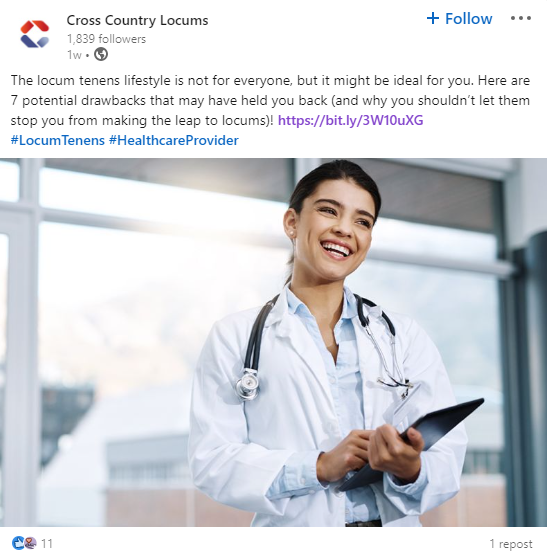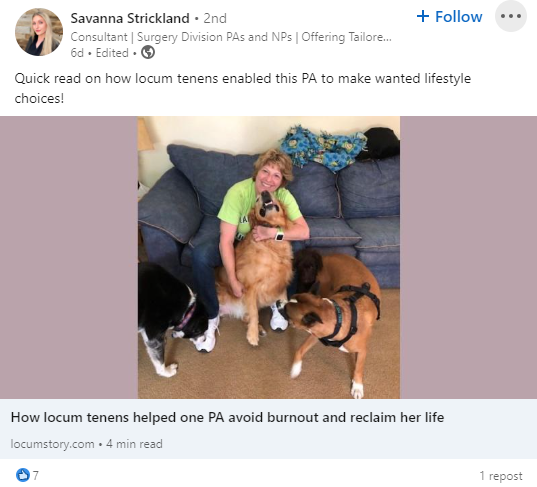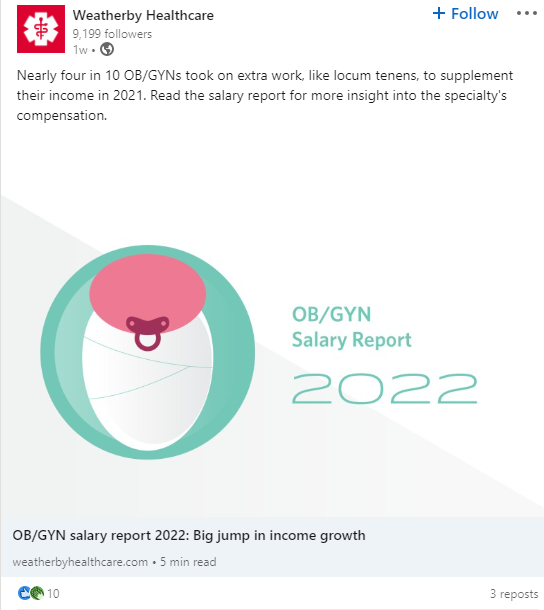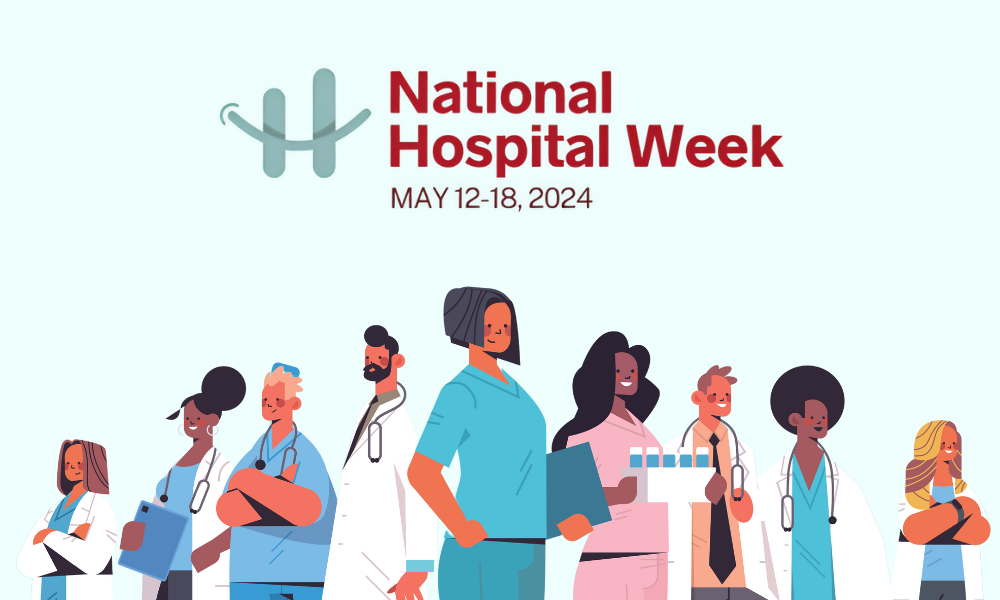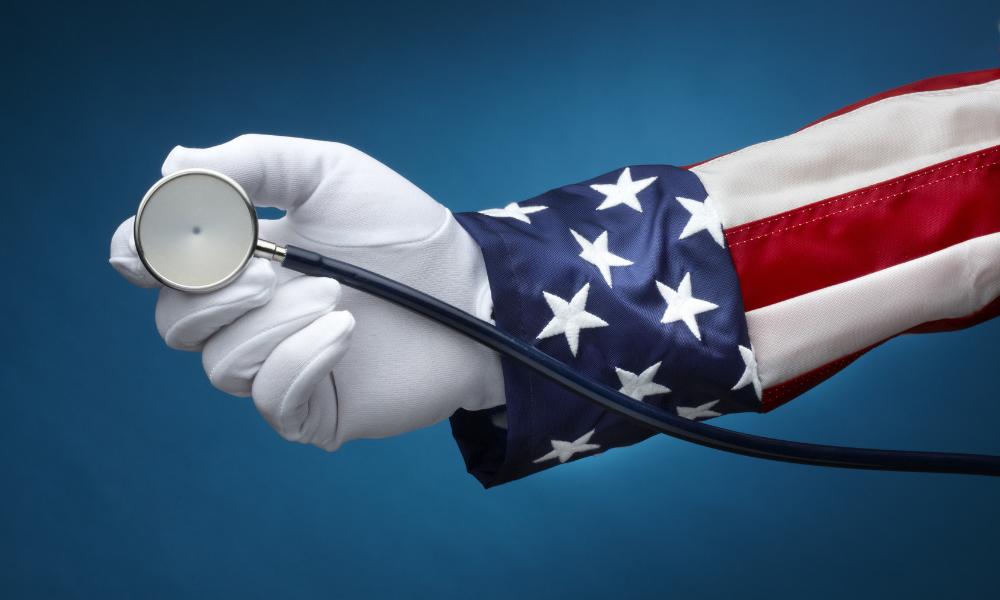In This Issue:
- Outstanding Medical Social Media Influencers of 2022
- CPAs Share Tax Insights for Locums Docs
- Tips for Your Next Locums Assignment
- Local Locums: Caring for Patients Close to Home
- Most Physicians Question NPs’ Care Decisions, Survey Finds
- Why Doctors Don’t Seek Mental Health Help
- Healthcare Leaders Expect Turbulent 2023 Operating Environment
- How to Spend Your Physician Sign-On Bonus
- Socially Speaking: Posts from Cross Country Locums, Locumstory, Weatherby, Barton Associates, and more.
- Mayo Partners with Augmented Reality Medtech Company
Outstanding Medical Social Media Influencers of 2022
(Edited from MDLinx article by Joe Hannan, 12/14/2022)
Key Takeaways
- Physicians can use social media platforms to educate peers and patients, provide emotional support, or advocate.
- Several studies have established social media as an effective tool for meeting these objectives.
- Clinicians who are interested in building their social media presence should consider following the example of these seven physician influencers.
Love it or loathe it, social media can have a positive effect on human health and medicine. Research has demonstrated that when clinicians share knowledge via social media, it helps improve how people seek and use health information, keeps patients and providers informed, offers emotional and peer support for those undergoing care, and keeps colleagues connected socially and intellectually.[1][2][3]
Physicians who have some clinical pearls they would like to share in 2023 may want to follow the example of these seven social media-savvy physicians.
1. Akua Ampadu, MD
The COVID-19 pandemic exacerbated physician burnout in the US. According to a 2022 survey published by The Physicians Foundation, six out of 10 doctors reported feelings of burnout in 2022, compared with four out of 10 in 2018.
Dr. Ampadu can help. A hospitalist working for New York-Presbyterian Hospital, she also has extensive experience with locum tenens work. She parlays all of this experience into an impressive Instagram account through which she coaches physicians and other healthcare professionals on wellness, burnout prevention, locum work, and the skillful use of social platforms such as LinkedIn.
Looking to close 2022 with intention? Check out her End of Year Health Checklist. Or maybe you’re looking for a little fitness motivation in the New Year? Give this short-and-sweet post on accountability a read.
Related: Cardiologists educating cardiologists: The power of social media
2. Nancy Yen Shipley, MD
Orthopedic surgeon? Check. Businesswoman? Yes. Educator? Check. And a snowboarder to boot.
Add podcaster and Instagram influencer to this impressive list. Dr. Yen Shipley’s Instagram page is a trove of education and inspiration. Check out this post for a behind-the-scenes look at BEAR-enhanced ACL repair.
Dr. Yen Shipley also serves as a reminder of the growth that lies on the other side of resistance, whether that resistance is to gender discrimination (a topic covered on her podcast) or the fear of taking on a snowboarding race or an elevated ropes course. Dr. Yen Shipley shows us the power of persistence.
3. Nii-Daako Darko, DO
Doctors typically graduate from medical school and conclude residency with a wealth of medical knowledge. But a wealth of knowledge about building wealth? That’s often another matter entirely—and a critical one, considering that the mean medical school debt for 2022 medical school graduates is $205,037, according to the Association of American Medical Colleges.
Dr. Darko has some insights to offer. The trauma and acute care surgeon is the host of Docs Outside the Box, a podcast that blends medicine, finance, and a smattering of pop culture.
Dr. Darko’s mission is to deliver the distilled lessons of doctors and entrepreneurs who have used their money to improve their lifestyles—basically, the information you won’t find in your med school textbooks.
On Instagram, Dr. Darko shares tidbits of wisdom from his show. Check out these posts on overcoming money traps, conscious spending, and physician jobs that come from holding dual degrees.
4. Hazel Wallace, MD
There’s another area of medical education that’s apparently lacking (and another doctor who is working to close that knowledge gap): nutrition.
According to an American Journal of Medicine study, 22% of doctors recall receiving no nutritional training in medical school. And while the majority recalled some training, 35% said it was limited to only one lecture or a portion of one lecture.
Hazel Wallace, MD, a UK-based doctor and registered nutritionist, can give you nutritional guidance that patients can access, too. Her Instagram page will make your mouth water, your waistline smaller, and your nutritional knowledge more robust.
Ever wonder how much protein people should be eating daily? This post could offer some insights. Looking for some guidance on creating new eating habits? This post describes a useful approach. Or perhaps you just need a quick meal idea. This post, and many others, will get you started.
5. Will Flanary, MD
Dr. Flanary’s name may not ring a bell, but you may have heard of his hilarious alter-ego, Dr. Glaucomflecken. Dr. Flanary, an ophthalmologist, is the brain and sense of humor behind this entertaining character, whose satirical antics you’ll find on TikTok.
Long before becoming a physician, Dr. Flanary was a stand-up comedian. After COVID-19 shut down his practice, he turned to TikTok to pass the time and generate a few laughs. What began as a passion project now has 2 million followers and a supplemental revenue stream from YouTube and Cameo.
Need a laugh? Check out his satirical takes on health insurance, a surgeon’s (rare) apology, or the inner thoughts of a nephrologist.
Related: Uncomfortable Social Media Situations Doctors Should Avoid
6. Don S. Dizon, MD
Dr. Dizon lives a busy life. He’s the director of medical oncology at Rhode Island Hospital and the vice-chair for diversity, equity, inclusion, and professional integrity at SWOG Cancer Research Network.
He’s also a professor of medicine at the Brown University Medical School, a researcher (he’s a co-author on one of the papers mentioned at the top of this article), and a patient advocate. Rounding out this impressive CV, Dr. Dizon is a medical social media pioneer.
You’ll find Dr. Dizon on Instagram, TikTok, and Twitter. On the first two platforms, he shares heartfelt patient stories, a lesson on the words physicians use with patients, and the importance of connecting with patients. His Twitter account is a wealth of information for current and aspiring oncologists alike.
Related: TikTok: A tool for physicians, or a risk to professionalism?
7. Sasha Shillcutt, MD
Anyone who finishes residency most likely has developed a near-superhuman power to go above and beyond the call of duty, all while being sleep-deprived and stressed. Perhaps a side effect of that power is difficulty in setting boundaries. Sound familiar? Dr. Shillcut is here to help.
Dr. Shillcutt is the anesthesiologist, professor, and entrepreneur behind Brave Enough, which teaches women physicians how to establish work-life control.
She is also an author. Her most recent book, Brave Boundaries, may help physicians who struggle with saying no, a word that may have been trained out of their vocabulary.
Dr. Shillcutt’s Instagram page is a great place to gain a sense of who she is and what lessons she has to offer. Check out her posts on handling the opinions of others, the importance of setting boundaries, and the nature of female authority.
What This Means for You
Social media can be an invaluable tool for physicians. These influencers highlight how social media platforms can serve as places of patient advocacy, peer and patient education, and wisdom on topics such as finances and work/life balance. Doctors who are interested in building their social media presence will find good models in these noteworthy examples.
All News Is Locums
CPAs Share Tax Insights for Locums Docs
(Edited from intro to Dr. Andrew Wilner’s podcast, “The Art of Medicine,” episode 74, 12/14//2022)
While physicians receive extensive medical training during years of medical school, residency, and often a fellowship, their financial education is usually minimal to nil.
Some physicians may want to complete their own tax returns, but they do so at their own risk. Tax planning with the assistance of a professional can maximize retirement contributions while reducing taxable income with tax deductions.
During this 30-minute interview, we
- Define “tax-deductible expenses” and how to track them.
- Discuss the relative merits of working as a ‘1099’ vs. a ‘W2’ employee.
- Highlight the advantages and disadvantages of a sole proprietorship, LLC, and S-Corp.
- Offer tips on how to work effectively with your CPA.
Ben is the owner of Locums Tax, PLLC. He specializes in helping locum tenens physicians comply with the Internal Revenue Service (IRS) code (i.e., pay their taxes correctly)!* To learn more, find Ben Nanney on LinkedIn: linkedin.com/in/ben-nanney-2854a044 or via his website: Yourlocumstax.com.
Jarin Dana is CEO at Fusion Healthcare Staffing and a partner in the accounting firm Frost Dana Newman, LLP. Jarin Dana’s LinkedIn profile is linkedin.com/in/jarindanafusionhcs. You can also contact him at the Frost Dana Newman, LLP, website: fdncpa.com.
* Tax info links below are provided by Ben Nanney.
You can also listen to “The Art of Medicine with Dr. Andrew Wilner” on the web: https://andrewwilner.buzzsprout.com/ and on your favorite podcast player! Please search for “The Art of Medicine with Dr. Andrew Wilner.”
Feedback is welcome! Please rate, review, and share every episode you learn from and enjoy! You’ll find a new program every two weeks. To receive the latest updates and links, please sign up at: www.andrewwilner.com. To contribute: https://www.patreon.com/andrewwilner
* Taxes: Business Structure For Locums
https://www.whitecoatinvestor.com/loc… LLC Doesn’t Offer Malpractice Protection
https://www.wolterskluwer.com/en/expe… An S-Corp Does Not Work Well With Outside W2
* Taxes: Income
https://www.whitecoatinvestor.com/why… An Overview of S-Corp-
https://www.whitecoatinvestor.com/s-c… An Overview of Self-Employed Retirement Accounts:
https://www.whitecoatinvestor.com/bes… An Overview of EV Tax Credits:
https://www.irs.gov/credits-deduction… Great Overall Primer On Doc Finances:
https://www.amazon.com/White-Coat-Inv…… A Doctor’s Guide to Personal Finance and Investing
Tips for Your Next Locums Assignment
(Edited from Jackson + Coker post, 11/21/2022)
Your focus should be on your patients, not what’s happening at your house.
You love the opportunity to travel across the country taking locum tenens jobs. Experiencing new places, new sights, and sounds. But how can you secure your home base while you’re away for days or weeks at a time?
Here are things to consider before you leave:
1. Security
Strategies to make your home have that “lived-in” look while you’re away on a locum tenens job include:
- Hire a house-sitter or ask a neighbor to stop by periodically.
- Put holds on mail and newspaper delivery so they don’t pile up.
- Install motion-sensor lights outdoors and set indoor lights on timers to come on at different times.
- Make sure to leave a key and security system code with a trusted relative or friend.
2. Bill Pay
It’s easy to forget the basics while you’re away. Before you leave, set a plan to make sure all bills are paid during your LT assignment.
You may want to:
- Set up automatic payments for utilities, rent/mortgage, car payments, and insurance.
- Pay ahead if you know how long you’ll be away.
- Enroll in e-billing so you can pay from your laptop or smartphone. Create a calendar of due dates and set up notifications on your phone.
Jackson + Coker offers locum tenens physicians a weekly direct deposit so you don’t have to worry about getting paid while on assignment. We always pay on time.
3. Upkeep
Prepare your house to sit idle.
- Ask a friend to take out your garbage.
- Hire someone to mow your lawn or shovel snow from your walk and driveway.
- Unplug/disconnect electronics, including your garage door.
- Turn off your water supply. Consult your heating professional on whether it’s safe for your particular system. Remember to also leave on fire sprinklers.
- Set your thermostat to a safe temperature to keep away condensation in the summer or to protect pipes in the winter.
- Check your sump pump to avoid rainwater issues in your basement.
- Don’t forget your car! Have someone drive it around the block a few times periodically.
Create a checklist that you can go back to each time you leave for an extended assignment. Then you can feel secure knowing everything is safeguarded back at home.
Local Locums: Caring for Patients Close to Home
(Edited from Weatherby Healthcare blog post by Lindsay Wilcox, 11/15/2022)
While many physicians appreciate the benefits of locum tenens — schedule flexibility, great pay, work/life balance — not all physicians want to hop on a plane and spend an extended time away from their families. But you may be surprised that this isn’t your only option. It is possible to find locum tenens opportunities close to home, which can be a nice option for those physicians who want to stay near family or avoid traveling by plane.
Why choose locum tenens assignments close to home?
Many physicians opt to forego locum tenens placements in far-flung destinations, instead pursuing opportunities in more comfortable, local hospitals and clinics. The reasons vary.
One of those reasons is being an applicant in a relentless job market. In Dr. Stephanie Bui’s case, a vascular surgeon from Missouri was motivated to start working as soon as possible. Rather than waiting for an economic upturn — largely out of her control — she decided to jump at the chance to work in a surgery center as a locum tenens surgeon.
“I wanted to expedite my return to the operating room, where I am useful. I felt energized by the possibility of just working right away, of being in the OR, of filling in a spot that was needed especially at that facility.
“I see my inner mentality as just going where you are needed. That is a healthcare mentality. Just because I can’t recognize the outside or the airport or the highway doesn’t mean I can’t do great work in the OR, where I know how things are going to go. The OR is kind of like a sanctuary,” Dr. Bui continued.
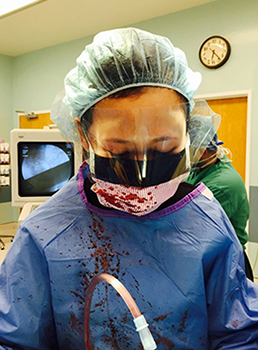
Dr. Stephanie Bui
Dr. Michael Cormican, a trauma surgeon and critical care intensivist, jumped at the chance to pursue local locum tenens opportunities near his home base of Gainesville, Georgia, just northeast of Atlanta. One of his major draws? The ability to get insider knowledge on the workings of other institutions.
“I enjoy dropping into other places and seeing how things run. I enjoy seeing a different side of things, seeing different hospitals, and getting to know different people. And then, as well, seeing how other places do things while also trying to impart my ways to these different places.”
Other reasons for pursuing locum tenens jobs in nearby communities include an ease of travel, the ability to manage work/life balance, and the chance to make a difference for your neighbors.
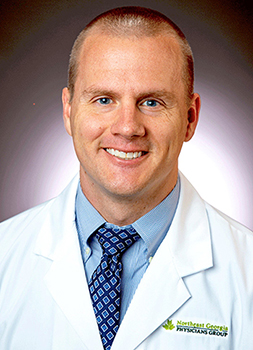
Dr. Michael Cormican
How They Got Their Local Jobs
There are several ways to find these unique opportunities to work as a locum tenens near your home base.
Dr. Roseann Freundel, an obstetrics and gynecology specialist from Virginia, transitioned to more local opportunities from her original locum tenens placements further afield.
“Some of the assignments that I originally had were up in Maine or California. Some of them required an 18- to 20-hour travel day and three planes. Just for my own sanity and energy level, I asked my locum tenens agent if they could find something a little bit closer to home so that I would not be spending so much travel time.
“Now, my placement is four hours away by car.”

Dr. Roseann Freundel
Dr. Kamlesh Jha is originally from India but has practiced medicine in a variety of capacities in North America — both the Yukon, Canada, and around the United States — since 2005. His most recent work is as a neonatologist in Chicago. He leaned on healthcare staffing agencies (like Weatherby) to connect him to nearby locum tenens jobs in the Midwest.
“Since working with them, I have taken calls at a University of Chicago satellite unit, Ingalls Memorial Hospital. And recently, I accepted an assignment through Weatherby in Indiana at the Extension Health Center.”
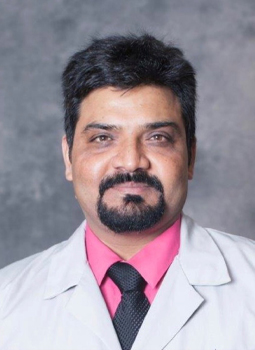
Dr. Kamlesh Jha
How the Commutes, the Jobs, and the Commitments Vary
Commutes vary for local locum tenens job seekers.
Dr. Cormican enjoys the short commute: “One of my placements is literally about two miles away. The other one is about five miles away, and the third one is probably 10 to 15 miles away. Those have been pretty easy and really convenient.“
Dr. Jha also typically has a shorter commute time; he travels 45 minutes maximum from his home for his Chicago placements. For the slightly further job in Indiana, he takes the bus since the travel time is roughly the same whether he takes a bus or drives himself. This gives him the flexibility to relax along the way.
While Dr. Freundel does not have the convenience of options within a 15-mile radius, she is happy with the selection available to her. “There are five hospitals that I have been able to get placements that are within a reasonable driving distance, anywhere from one to five hours from my home. That is very doable.” Her assignments vary from overnight stays to day trips.
Dr. Bui, meanwhile, takes a different approach. Her locum tenens placement typically lasts a week to 10 days at a time and is located about an hour and a half outside of Kansas City. “I go there and I stay there because of being on call. I do not commute every day. I just go and then stay there for the remainder.”
Assignments vary as much as the commutes. Lucky for physicians interested in local locum tenens, a variety of options are available, and most preferences can be matched.
The Benefits of Taking Locum Tenens Assignments Close to Home
The upsides of working locum tenens are well established; however, a local placement unveils even more unique perks — like a cherry on top.
1. You Can Get the Job Done More Reliably.
Not being beholden to an airline’s schedule makes Dr. Bui a more dependable employee. This was especially important during the height of the COVID pandemic.
“It was very reassuring to me that if the airline shut down, canceled, or required passengers to quarantine, that regardless, I could still get to my assignment because I was driving. That flexibility is important to me to have — I just want to be where I need to be, especially for something like work.”
2. No Airport Waits.
“It eliminated air travel from the equation, and simplified traveling between the two places,” said Dr. Bui about her local locum tenens assignment.
In the era of pandemic travel, avoiding busy airport terminals was also a smart personal safety move.
3. Access to Less Competitive Jobs and Unique Medical Technology.
Dr. Jha has used his locum tenens placements to get access to work that would otherwise be unavailable to him:
“In Chicago, there is a lot of competition. Most of the hospitals are located here, so many times, you may not get into a level III trauma center as locums because there are already a lot of people working in that institute. I wanted to do intensive care after my training, and I did not want to do lower-level work.”
He is also attracted to new equipment that might not be available at his normal work facility. “With access to level III jobs, I can use technology that I wouldn’t otherwise be able to for post-op cardiac management.”
The chance to try out new tech or find work otherwise unavailable to you — or hard to get — is an upside of pursuing local locum tenens on top of your full-time gig.
4. Better Work/Life Balance.
Dr. Freundel shares: “I could more easily travel back and forth, which allows me to shorten the length of some of my assignments, take a couple of days off, and then come back instead of being stuck up there for weeks.”
She also found that local locum tenens assignments allowed her to better manage her household duties, making home ownership less stressful.
“There are things you need to do, like pay bills and keep up with house stuff. If you are away for a significant period of time, I would have no one to take over those chores. Now, it is a lot easier.”
5. Ability to Maintain Important Relationships.
Dr. Bui finds that local locum tenens allows her to maintain close relationships and care for her family.
“It allows me some flexibility to look in on my parents and their health issues. Since I don’t have any family in Michigan, I knew the position was not something that I could continue after my three-year contract was up for renewal. That is not the case with my local locums placements.”
6. A Tangible Professional Development Opportunity.
Dr. Cormican has found great satisfaction in the perspectives he’s gained from his local locum tenens placements.
“My background is more surgical critical care, and most of the locums jobs I have done have been more medical critical care, particularly with COVID. The surgical and medical world is totally different, and so seeing from that perspective has been pretty helpful.”
“It’s definitely helped me see there are a million different ways to get to the right result.”
The Healthcare Staffing Story
Most Physicians Question NPs’ Care Decisions, Survey Finds
(Edited from Beckers Hospital Review article by Mackenzie Bean, 11/29/2022)
Nearly 80% of physicians say they occasionally or regularly question a nurse practitioner’s treatment decisions, according to Medscape’s Evolving Scope of Practice Report published Nov. 29.
For the report, Medscape surveyed 750 professionally active US physicians in more than 28 specialties between June 6 and Aug. 9.
Five Survey Findings:
- Fifty percent of physicians said they occasionally question an NP’s treatment decisions, while 29% said they often do.
- Physicians shared similar responses when asked about physician assistants: Fifty-four percent said they occasionally questioned a PA’s care decisions, and 26% said they often do.
- Overall, most physicians said they were satisfied with PAs and NPs’ patient interactions at 74% and 71%, respectively.
- However, 23% of physicians said expanding PAs’ treatment abilities would be negative generally for patient care. Thirty-four percent of physicians said the same for expanding NPs’ scope of practice.
- Sixty-one percent said states should not expand PAs’ scope of practice, and 69% said the same for NPs.
Why Doctors Don’t Seek Mental Health Help
(Edited from Omnia Health article by Vaishnavi Venkataraman, 12/9/2022)

Medical professionals are superheroes whose stressful routine distracts them from addressing their own well-being.
Mental health is a key factor in determining one’s overall health condition. Staying mentally healthy is essential for everyone and is a vital criterion for doctors. Very often we tend to think that doctors have it all together and need little support.
However, medical professionals are continually exposed to heavy workloads, traumatic conditions, erratic working hours, and challenging situations. Yet, seeking help for mental health might be the last thing most doctors have on their to-do lists.
It does not take too long for medical professionals to feel burnt out in life. A study conducted at the University of Pennsylvania in 2006 showed a burnout rate of 4.3 to 55.3 percent in the first post-graduate year of training, commonly known as the “intern” year. Emotional exhaustion, depersonalization, and a sense of decreased personal accomplishment were some of the common traits associated with students within the first year.
The American College of Emergency Physicians cited a recent article published in The Atlantic, revealing that 300 to 400 physicians die by suicide each year. The study also revealed that suicide rates were 250 to 400 percent higher among female physicians when compared to females in other professions.
Another study conducted by Medscape on physician suicide in 2022 revealed that 11% of female doctors and 9% of male doctors have had suicidal thoughts. Moreover, 64% of doctors experienced colloquial depression.
Dr. Shaju George, a specialist psychiatrist at the Dubai Community Health Centre, said that doctors lead a very stressful lifestyle. Therefore, they are unaware or at times even ignorant of mental health issues.
“Suicide rates are the highest among doctor groups–especially surgeons, psychiatrists, and critical care experts. Depression, anxiety disorders, hypertension, diabetes, and heart attack are also common among physicians. However, seeking help is minimal,” Dr. George said.
He added that awareness-building sessions among doctors could help bridge the gap and reduce the taboo and stigma associated with seeking help for mental health.
Physicians are often looked upon as superheroes who seldom need any help. We look up to doctors to solve our woes, and often think they are strong and capable of anything. And this is just what makes it hard for doctors to realize they need help and take time away for their mental well-being.
It is time to normalize physicians seeking mental help. But how can this be achieved?
Here are some ways healthcare providers could change the game for physicians that need mental help.
Encourage a safe space for expression
For doctors, it is natural to feel stressed or burnt out. But brushing aside the feeling and trying to keep it all together might not help. Instead, it is best to speak up. Confide in a trusted colleague, friend, or family member. Dr. George stressed that hospitals and clinics should initiate regular check-ins with their physicians. Wellness programs can be made a part of hospitals so that doctors have immediate help on hand and do not have to shy away from seeking help.
Evaluate workloads
Physicians tend to take on more work and feel burnt out. As an immediate measure, healthcare employers should weigh the workload given to their professionals and set achievable goals. The conversation here must not be whether a physician can take stress or not; rather it must redefine workloads and ensure doctors are not overburdened with responsibilities.
“Hospitals should conduct regular surveys and screenings anonymously to understand what doctors go through. This would help them diagnose stress levels and also analyze the severity”, Dr. George added.
Maintain confidentiality
Patients view physicians as healers or icons of good health. So, while mental health may be a topic that should be openly discussed, this may not be an ideal solution for a physician as it could affect their careers. Hospitals must ensure that utmost privacy is provided to protect those who seek help for mental health reasons.
Related: The weight of men’s mental health
Healthcare Leaders Expect Turbulent 2023 Operating Environment
(Lightly edited from Healthcare Dive article by Hailey Mensik, 12/16/2022)
Dive Brief:
- Leaders at hospitals and health systems across the country are anticipating a potentially turbulent operating environment in the coming year, according to a survey from Deloitte.
- Among health system leaders, 85% said staffing challenges would have a major impact on their 2023 strategy and 76% said inflation is a significant factor. Other expected headwinds include affordability issues for patients, shrinking margins, and continual supply chain disruptions.
- Deloitte also polled health plan executives and found they face challenges related to inflation and a tight labor market, though are generally in a better financial position than hospitals and health systems.
Dive Insight:
Hospitals are still being impacted by the COVID-19 pandemic, with staffing shortages and burnout continuing to pose major challenges to systems. Inflation and heightened expenses have hurt hospital margins, and are expected to continue into next year.
That’s causing some concern to healthcare executives, according to Deloitte’s survey, which included responses from 71 executives at both health systems and health insurance companies with revenue over $500 million.
Among health system executives, 37% said they feel cautiously positive about the coming year, while 32% said they feel negative. Only 5% of respondents said they feel positive.
Among health plan executives, 43% said they feel cautiously positive and 23% said they felt positive, while just 3% said they feel negative.
Inflation has not yet fully hit payers, as they are typically locked into contracts with providers that stipulate rates for several years. That will change in the coming years as more contracts are renegotiable.
Labor expenses have been rising for hospital systems, and facilities are focused on remedying staffing woes in the coming year, as systems face widespread burnout and heightened turnover.
Nearly 90% of respondents said investing in their workforce next year was important or very important.
Tools to Try/News to Use
How to Spend Your Physician Sign-On Bonus
— Here are a few rational ways to use the lump sum of money
(Edited from MedPage Today column by Jordan Frey, MD, 12/14/2022)
Receiving a sign-on bonus when you sign your first physician contract feels awesome. But it can also feel a little overwhelming. At least I felt that way.
Here we are, finishing medical training with tons of debt, few to no investments, little to non-existent financial education, and potentially a sense of delayed gratification. Then we are handed a huge lump sum of money.
What are we supposed to do with this money? Are we using it wisely? Should we use it at all? All of these questions swirled around in my head when I received my physician sign-on bonus.
So, it makes sense to examine the best ways to use a sign-on bonus.
In fact, these “best uses” apply anytime a physician receives a bonus or a lump sum of money — it doesn’t have to be the first sign-on bonus. But really, that first bonus is the most shocking and usually the one that we are least prepared for and educated about!
Some of you may be thinking, wait…what physician sign-on bonus? Before we get into the best uses, let’s talk about the sign-on bonus itself. While not a part of every contract, a lump sum sign-on bonus is typical of the majority of physician contracts. If you receive an offer letter (more about how to handle those here) or a contract without such a bonus, I highly recommend negotiating.
A Few Important Caveats
It is important to remember that this bonus is income. Therefore it is subject to income taxes. So some amount will generally be withheld by your (future) employer. If not, you should self-withhold some of the bonus. Otherwise, you will be in for a surprise come tax time.
Also, the sign-on bonus usually comes with a stipulation–you only keep the bonus if you work with the employer for a certain amount of time. Usually, that term is one year. If you leave early, you need to pay it back. I’ve even seen some employers call this sign-on bonus a “forgivable loan,” meaning it is a loan that is forgiven once you work a certain time period. I think that is odd.
With this understood, let’s move on to the best uses for these bonuses. Let’s break this up into two realities.
In an Ideal World
Remember, the formula to build wealth and reach financial freedom is to create and grow your margin. And your margin is the difference between what you make and what you spend. While your budget and philosophy of intentional spending help you create the margin, your written financial plan will guide you in growing your margin.
Your written financial plan will have a prioritized list of financial goals. For example, here is my financial plan:
- Pay down high-interest loans/debt (>8%). Done! (as of 10/2020)
- Establish emergency fund (3-6 month’s expenses) Done! (as of 12/2020)
- Maximize Voluntary Defined Contribution (VDC) retirement account.
- Pay down medium interest loans (6-8%).
- Invest in vetted real estate (cash-flowing rentals with cash-on-cash ratio >10%).
- Contribute to 529 college savings account.
- Maximize 457(b) retirement account.
- Pay extra to mortgage.
- Pay down low-interest loans (<3%).
- Contribute to back-door/spousal Roth IRA.
- Contribute to retirement taxable account.
- Donate to charity with equity dividends.
Once you have your personalized financial priority list, the decision of what to do with any monetary windfall becomes easy. Simply put the money towards your top priority until that priority is fulfilled. Then move on to the next priority, and so on until the bonus runs out.
Unfortunately, we do not live in an ideal world. So, let’s examine our other, more accurate reality.
In Our Non-Ideal World
It would be great if all of us were completely rational, and we all used our bonus solely to accelerate our path to financial freedom, and living and working on our own terms. But that is not reality. And I think this is a good thing.
So, especially when you are finishing your training and about to start your first job, other ideas typically come to mind. Let’s look at these more closely.
Moving Expenses
I lead off with this because you should not have to use your sign-on bonus to cover moving expenses. Your employer should cover these separately. That is what is typical. If moving expenses aren’t included in your contract, negotiate them. Remember, however, these are now taxable as well.
A Down Payment on a House
Whether to buy a home right out of training or to rent is a very nuanced discussion. However, my more generalizable advice is to initially rent coming out of training. This gives you time to evaluate your new job and potentially a new city before making a significant and not easily transferable financial commitment.
But in certain circumstances, buying a home out of training can make sense. For instance, that is what I did. In this case, your physician sign-on bonus can be used as a down payment. Actually, you can often avoid needing a down payment using a physician home loan.
Again, you need to evaluate your own unique financial situation in determining (A) if you should buy a home out of training, (B) if you should use a physician home loan or not, and (C) if and how much a down payment to use. But this is a common and potential use for a physician sign-on bonus.
Buying a Car
This may be another good use for a sign-on bonus. However, do not use it for a down payment on a car loan! If you cannot buy the car you want in cash, then you can’t afford it. Simple as that.
But if you are buying a car in cash using your bonus, make sure you are doing so intentionally!
I bought a used Toyota for $4,000 after training — the car I still drive today. Why? Because I’m not a car person, so instead, I just use that extra money to buy other things that bring me joy or to accelerate my path to financial freedom.
Vacation
I fully support this as a non-wealth-building expense for your physician sign-on bonus. The time after training but before you start your first job is the last time that is truly yours before you retire. Use it and enjoy it. Consider it an investment in yourself and your sanity.
How Did I Use My Physician Sign-On Bonus?
It’s impossible to proscribe that there is a “right” way to use your physician sign-on bonus. There is certainly a wrong way — wasting it on a thing or things that neither bring you joy nor help you advance on the path to financial freedom. But there is no singular right way. In fact, I like the 10% rule: take 10% of your windfall and spend it guilt-free; then save, invest, or pay off debt with the rest.
As for me, my wife and I used my sign-on bonus to:
- Pay off some of our credit card debt
- Put towards a down payment on our first cash-flowing investment rental property
- We benefited from the fact that we used a physician mortgage on our primary home that did not require any down payment. We did this because the monthly mortgage payments still fit very well within our financial plan and allowed us to reach our other financial goals.
These moves significantly helped us increase our net worth by six figures in 1 year and advance our financial freedom. But in retrospect, taking 10% and putting it towards a vacation would have been great as well!
Disclaimer: The author is not an attorney, accountant, or financial advisor. His expertise is in the field of medicine. Any information in this op-ed and its links should not be considered personalized financial advice.
Jordan Frey, MD, is a plastic surgeon at Erie County Medical Center in Buffalo, New York, and founder of “The Prudent Plastic Surgeon.”
How ‘Bout This?
Mayo Partners with Augmented Reality Medtech Company
(Edited from Becker’s Hospital Review article by Noah Schwartz, 12/19/2022)
Rochester, Minn.-based Mayo Clinic has partnered with augmented reality medtech company MediView through a know-how agreement that will work to advance the use of augmented during surgery.
With the MediView augmented reality headset, clinicians can visualize three-dimensional images of a patient’s anatomy and other important surgical information.
Under the terms of the agreement, Mayo Clinic will provide clinical, technology, and research expertise to the company, according to a Dec. 19 MediView news release.
“We will equip practitioners with intuitive surgical visualization and navigation tools to inform clinical decision-making to confidently deliver better care to more patients,” Mediview President and CEO Mina Fahim said.


